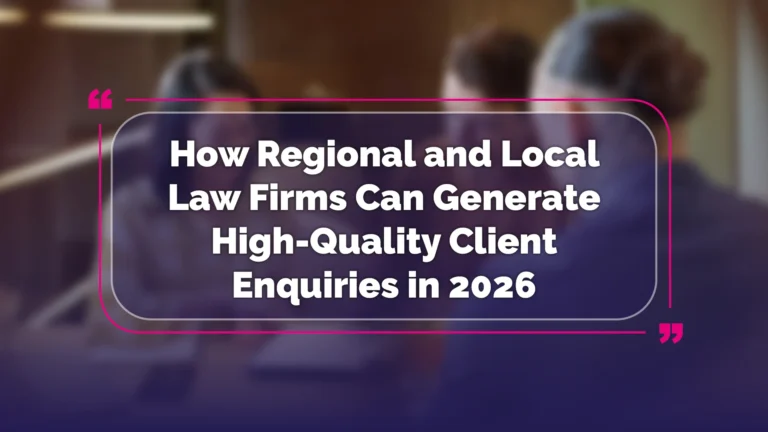PPC (pay per click) advertising has revolutionised how law firms and solicitors approach marketing in the digital age. Legal sector marketing through paid ads, including Google Ads, Facebook ads, and LinkedIn ads, offers unprecedented opportunities for lead generation and client acquisition in the UK market. This comprehensive guide will walk you through everything legal professionals need to know about implementing effective PPC strategies for their law firms.
Top Takeaways
- PPC advertising allows law firms to pay only when someone clicks on their ads, making it cost-effective for lead generation
- Google Ads typically provides the highest ROI for legal sector marketing due to high-intent searches
- Facebook ads and LinkedIn ads can effectively target specific demographics and professional backgrounds relevant to legal services
- Legal lead generation through PPC requires careful compliance with advertising regulations and ethical guidelines
- Measuring ROI in legal PPC campaigns involves tracking both immediate conversions and long-term client value
- Converting PPC leads into paying clients requires specialised follow-up strategies tailored to legal consultation needs
Understanding PPC and Paid Ads in the UK Legal Sector
Pay per click advertising represents a fundamental shift from traditional marketing approaches that law firms have historically relied upon. In the UK legal sector, PPC allows solicitors and law firms to bid on keywords that potential clients might search for, such as “personal injury solicitor” or “family law solicitor.” When someone searches for these terms, your law firm’s ad appears in the search results, and you only pay when that person clicks on your ad.
The beauty of PPC for legal professionals lies in its precision and measurability. Unlike traditional advertising methods where you might spend money without knowing who actually saw your message, PPC provides detailed data about who clicked your ads, what they searched for, and whether they became clients. This level of insight is particularly valuable in the UK legal sector, where client acquisition costs can be significant and return on investment must be carefully tracked.
Key components of UK legal sector PPC include: • Keyword research targeting legal services and practice areas • Ad copy that addresses specific legal concerns and pain points • Landing pages optimised for legal consultations • Compliance with Solicitors Regulation Authority (SRA) advertising regulations • Budget management to maximise lead quality over quantity
Setting Realistic Expectations for UK Legal Sector Marketing
Many law firms approach PPC with unrealistic expectations, expecting immediate results or believing that simply running ads will automatically generate clients. The reality of UK legal sector marketing through PPC requires patience, strategic planning, and ongoing optimisation. Initial campaigns may take several weeks to gather sufficient data for optimisation, and the learning curve can be steep for legal professionals unfamiliar with digital marketing.
Legal lead generation through paid ads operates differently than other industries because legal services are typically high-value, high-consideration purchases. Potential clients don’t make quick decisions about hiring a solicitor; they research, compare options, and often consult with multiple firms before making a choice. This means your PPC campaigns should focus on building awareness and generating qualified leads rather than expecting immediate conversions.
The competitive nature of legal PPC also affects expectations. In many UK markets, legal services are among the most expensive keywords to bid on, with costs per click often ranging from £30 to £150 or more. This high cost reflects the high value of legal clients, but it also means that law firms need to be strategic about their budgets and targeting to ensure profitability.
Realistic expectations for UK legal PPC include: • Initial campaigns may take 30-60 days to optimise effectively • Cost per lead will typically range from £80 to £800 depending on practice area and location • Conversion rates from PPC leads to clients may range from 5-20% • ROI becomes positive typically after 3-6 months of consistent investment • Ongoing management and optimisation are essential for success
Measuring Performance in UK Legal Sector PPC Campaigns
Measuring performance in UK legal sector marketing requires tracking more than just clicks and impressions. While these metrics provide basic insights into ad visibility and engagement, legal professionals need to focus on metrics that directly impact their bottom line. The most important metric is cost per acquisition (CPA) – how much it costs to acquire a paying client through your PPC campaigns.
Google Ads provides comprehensive tracking tools that allow law firms to measure performance across multiple touchpoints. Phone call tracking is particularly crucial for legal services, as many potential clients prefer to speak directly with a solicitor before scheduling a consultation. Call tracking software can attribute phone calls to specific ads, keywords, and campaigns, providing valuable data about which PPC efforts generate the most qualified leads.
Beyond basic metrics, legal firms should track the lifetime value of clients acquired through PPC. A personal injury case might generate £10,000 in revenue, while a simple consultation might only be worth £200. Understanding these differences helps determine appropriate budgets and bidding strategies for different practice areas and client types.
Essential PPC performance metrics for UK law firms: • Cost per lead (CPL) and cost per acquisition (CPA) • Click-through rates (CTR) and conversion rates • Quality score and ad relevance metrics • Phone call volume and duration from PPC traffic • Client lifetime value by source • Return on ad spend (ROAS) by practice area
Converting PPC Leads in the UK Legal Sector
Converting PPC leads into paying clients in the UK legal sector requires specialised approaches that respect the unique nature of legal consultations. Unlike other industries where customers might make immediate purchases, legal clients typically need extensive information, reassurance, and consultation before committing to representation. This means your lead conversion strategy must be designed around the legal consultation process.
The first step in converting legal PPC leads is ensuring that your landing pages and follow-up processes align with what potential clients expect. When someone clicks on an ad about personal injury, they expect to find relevant information about personal injury law, not generic legal services. Your landing pages should immediately address their specific legal concern and provide clear next steps for consultation.
Follow-up timing is critical in legal lead generation. Studies show that law firms that contact leads within 5 minutes of enquiry are 100 times more likely to convert them into clients than those who wait 30 minutes. This urgency requires either dedicated staff or automated systems to ensure prompt response to PPC-generated leads.
Effective lead conversion strategies for UK legal PPC: • Implement immediate follow-up systems (phone calls within 5 minutes) • Provide specialised landing pages for each practice area • Offer free consultations to reduce barriers to contact • Train staff on handling legal consultation inquiries professionally • Use CRM systems to track and manage PPC leads effectively • Develop nurture campaigns for leads that don’t convert immediately
Platform-Specific Strategies for UK Legal Sector Advertising
Google Ads remains the dominant platform for UK legal sector marketing due to the high-intent nature of search queries. When someone searches “divorce solicitor near me,” they’re actively seeking legal services, making Google Ads particularly effective for legal lead generation. However, Google has strict policies about legal advertising, requiring law firms to comply with local bar regulations and advertising standards.
Facebook ads and Meta ads offer opportunities to target specific demographics and life events that might trigger legal needs. For example, targeting recent divorce filings or people who have moved to a new area can be effective for family law and estate planning practices. However, Facebook has also implemented restrictions on legal advertising, limiting some targeting options and requiring compliance with platform policies.
LinkedIn ads provide unique opportunities for B2B legal services and professional legal matters. Corporate legal services, employment law, and business formation practices can benefit from LinkedIn’s professional targeting capabilities. The platform allows for precise targeting based on job titles, company sizes, and professional interests that align with specific legal services.
Platform-specific considerations for UK legal PPC: • Google Ads: Focus on high-intent keywords and location-based targeting • Facebook Ads: Target life events and demographic triggers for legal needs • LinkedIn Ads: Target professionals and businesses for corporate legal services • Compliance: Ensure all platforms’ legal advertising policies are followed • Budget allocation: Distribute spend based on practice area and target audience
Compliance and Ethical Considerations in the UK Legal Sector
The UK legal sector faces unique challenges with PPC advertising due to strict advertising regulations imposed by the Solicitors Regulation Authority (SRA) and other professional organisations. These regulations often require specific disclaimers, prohibit certain types of claims, and mandate that advertisements be “not misleading.” Legal professionals must ensure their PPC campaigns comply with these regulations to avoid disciplinary action.
Truth in advertising is paramount in UK legal sector marketing. Claims about success rates, settlement amounts, or guarantees can be problematic and may violate advertising rules. Instead, focus on factual information about your experience, credentials, and areas of practice. Many law firms find it helpful to have their marketing reviewed by compliance officers or SRA guidelines before launching PPC campaigns.
Professional responsibility extends beyond the initial ad to the entire client acquisition process. This means ensuring that landing pages, follow-up communications, and consultation processes all meet professional standards. The SRA has specific rules about online advertising that may affect how law firms can present their services through PPC campaigns.
Compliance requirements for UK legal PPC: • Review SRA advertising rules before campaign launch • Include required disclaimers and avoid prohibited claims • Maintain professional standards in all marketing materials • Document compliance efforts for potential audits • Regularly update campaigns to reflect changing regulations • Train marketing staff on professional advertising standards
Conclusion
PPC advertising represents a powerful opportunity for UK law firms and solicitors to generate qualified leads and grow their practices in the digital age. Success in UK legal sector marketing through paid ads requires understanding the unique aspects of legal client acquisition, setting realistic expectations, measuring performance effectively, and implementing specialised conversion strategies. Whether using Google Ads, Facebook ads, or LinkedIn ads, legal professionals must balance the potential for growth with compliance requirements and professional standards.
The investment in PPC for legal services can yield significant returns when executed properly, but it requires ongoing attention, optimisation, and adherence to professional regulations. UK law firms that approach PPC strategically, with proper expectations and compliance considerations, can build sustainable lead generation systems that support long-term growth and success in their practice areas.
Frequently Asked Questions
Q: How much should UK law firms spend on PPC advertising? A: Legal PPC budgets vary widely based on practice area, location, and competition. Many successful UK law firms allocate 10-20% of their revenue to marketing, with a significant portion going to PPC. Start with a modest budget of £1,000-£5,000 per month and scale based on performance and ROI.
Q: Is PPC worth it for small law firms in the UK? A: Yes, PPC can be highly effective for small law firms, especially those focusing on local markets. Local legal services often have lower competition and costs, making PPC more affordable. Small firms can compete effectively by focusing on specific practice areas and local targeting.
Q: How long does it take to see results from UK legal PPC? A: Initial results may appear within days, but meaningful optimisation typically takes 30-60 days. Most law firms see significant improvements in performance after 3-6 months of consistent management and optimisation.
Q: Can UK law firms run Facebook ads for legal services? A: Yes, but with restrictions. Facebook has specific policies for legal advertising that limit targeting options and require compliance with local advertising regulations. Always review Facebook’s advertising policies for legal services before launching campaigns.
Q: What are the most important metrics for UK legal PPC success? A: The most important metrics include cost per acquisition (CPA), return on ad spend (ROAS), conversion rates from leads to clients, and client lifetime value. Tracking phone calls and consultation scheduling is also crucial for legal services.
Q: Do I need a website to run successful UK legal PPC campaigns? A: Yes, a professional website is essential for legal PPC success. Your website serves as the landing page for your ads and must be optimised for conversions, mobile devices, and user experience to maximise the effectiveness of your paid ads.




